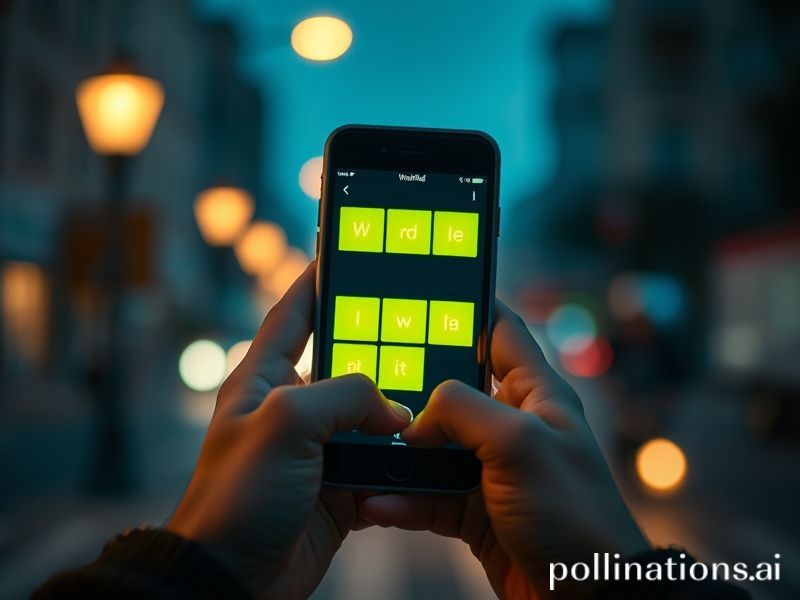Five Letters to Save the World: The Global Empire of the Humble Wordle Hint
PARIS—Somewhere between the fall of Kabul and the collapse of the Lira, humanity found a new daily barometer for civilizational decline: a five-letter word that may or may not contain two vowels and our collective dignity. The “Wordle hint” has become the lingua franca of a planet too exhausted to read the news but still vain enough to post green-and-yellow squares on Twitter. From Lagos to Ljubljana, commuters now sit in traffic, refreshing a browser tab for divine inspiration on whether the mystery word ends in ‑ATCH or ‑ITCH, while the actual world burns at a comfortable background temperature.
The phenomenon is marvelously democratic. In the same minute, a hedge-fund analyst in Singapore and a refugee aid worker on Lesbos might both whisper “could today’s Wordle start with S?”—an accidental solidarity forged in 24-hour spoiler-free etiquette. It’s touching, really. We can’t agree on carbon targets, but we’ve achieved unanimous consent that revealing the answer before midnight UTC is a war crime. The Hague is taking notes.
Global supply chains have bent themselves around the ritual. Finnish coders now schedule releases of their hint-giving bots to coincide with the New York Times’ daily reset, while Manila’s gig translators churn out Spanish, Tagalog, and Bahasa cheat sheets before the sun even strikes Reykjavik. The hint economy is worth, by some back-of-the-napkin calculations, roughly the GDP of Tonga—small, yes, but astonishing for an industry whose raw material is pure lexical anxiety. Venture capitalists in Tel Aviv have begun pitching “Wordle Intelligence Platforms,” promising AI-generated hints calibrated to your Myers-Briggs type. Because if there’s one thing the Middle East needs, it’s more artificially intelligent hot takes on where to place the letter R.
Diplomats have weaponized it. At last month’s G-20 sidebar in Bali, a junior aide from Canada slipped the British foreign secretary a folded napkin reading “Today’s word rhymes with MOURN.” London spent six hours analyzing whether this was code for imminent sanctions or merely Tuesday’s puzzle. Analysts call it “soft-power Scrabble.” The French, naturally, have launched their own sovereign clone—Le Mot—because relying on Anglo puzzles is apparently a form of neo-colonialism. Macron hinted darkly that any hint originating outside the Francophonie would be subject to a digital tax. Somewhere, Voltaire is updating his résumé.
Meanwhile, autocrats have discovered that controlling the hint is cheaper than controlling the press. In a stroke of Orwellian thrift, a Central Asian ministry now issues the day’s “suggested starting word” (always regime-friendly: POWER, ORDER, LOYAL). Citizens pretend not to notice that yesterday’s solution was PURGE. Everyone still plays; it beats the other state-sanctioned pastime of reporting your neighbor.
Sociologists argue the hint itself is a coping mechanism. When the Doomsday Clock lurks at 90 seconds to midnight, a discreet nudge—“two vowels, one sometimes Y”—is the least expensive form of therapy available. Climate psychologists call it “micro-control,” a placebo button for passengers on the Titanic. If rearranging five letters is all that stands between you and the abyss, who are we to deny the life raft?
Still, there are signs the honeymoon is ending. Brussels is drafting the Digital Hints Act, mandating spoiler warnings in 27 languages. The Kremlin has banned Wordle outright, claiming it’s a NATO psy-op designed to erode Cyrillic supremacy. And in Washington, a Senate subcommittee has subpoenaed the Times to investigate allegations that the puzzle difficulty spikes during debt-ceiling negotiations to distract the electorate. The committee’s working title: “Weaponized Vocabulary.”
Yet for now, the ritual persists. Billions of thumbs hover above glass, seeking that perfect hint—not too obvious, not too cryptic—like Goldilocks with a geopolitical hangover. Tomorrow the grid will reset, the planet will keep spinning toward its next catastrophe, and someone in São Paulo will text their group chat: “Starts with C, ends in the sound of human despair.” Close enough. We’ll take it.







